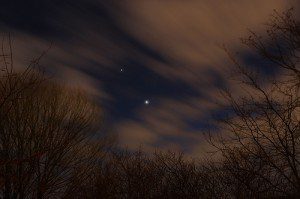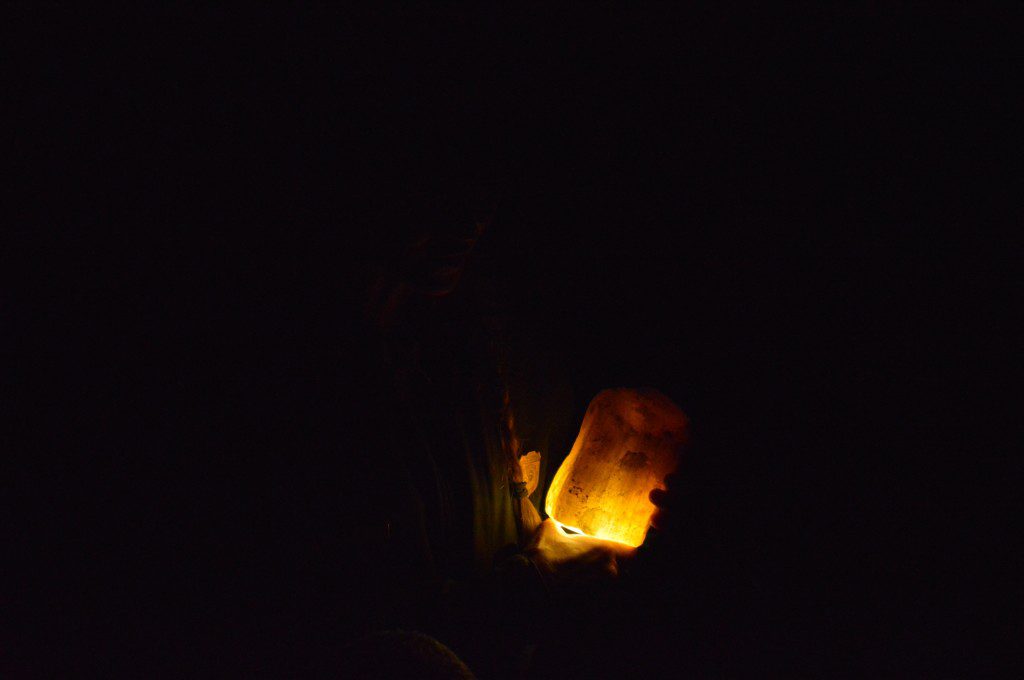
In Washington, DC, I didn’t have a good view of the Venus Transit. It was cloudy until sunset, so I pulled up NASA’s livestream from a telescope in Hawaii. For close to an hour, I flipped between the last tasks of work and the flickering image of a tiny dot sliding across the surface of a giant, shaggy circle. The light from the window, still warm and gray and pink at 7:30, hurt my eyes when I looked away from the screen. The transit won’t happen again until 2117, a year that even our children would need to be very healthy indeed to see. It was very special, and extremely rare, and totally boring.
We’re rarely surprised by events like last night’s. The work of scientists, cataloging our galaxy with diligence and wonder, ensures that we civilians can lay out our picnic blankets for any old meteor shower or eclipse, and find out what sort of welder’s glass we’d need to look at the sun directly while a planet passes in front of it. And it’s not just the astronomers and astrophysicists: my Android has an app that allows me to point the phone at my feet at noon and see what the night sky looks like over the Indian Ocean. (Without the internet, I would have needed a globe to find my exact antipodal, but there are probably also apps for that.) Our ability to map and predict the world around us is increasing at such a rate that we have a much harder time absorbing it all than we do accessing it. So, it’s the unexpected experiences that stick, the surprises, the sudden enlargements of our understanding with which rarity might be only incidentally related.
Three months ago, I went running in Rock Creek Park. I get this urge only about twice a year, when the weather warms, which means I’m so out of shape that the word ‘run’ is aspirational at best. Regardless, I was out in my running shoes, taking frequent breaks to catch my breath while pretending to be captivated by a daffodil. I moved south towards Georgetown, at the tiniest sliver of the park, right before it hits the Potomac. The trail winds along the east side of a branch of the river, under several road bridges, before dead-ending under a highway. The underside of each of these bridges smells like piss, and they are decorated with old, lackluster graffiti and the evidence of Red Bull-fueled trysts. It’s not an unsafe area to run, but it’s not overly lacquered, either. I’d been down here many times, and never seen a soul. I like it for that reason.
I stopped at the last bridge. There was a welcome darkness underneath where the river ran over a shallow bed of broken cement and rocks. I bent down to adjust my shoe, and when I stood up, my eyes had adjusted just enough to see a man, crouched behind a short wall in front of the bridge’s spandrel. It was so dim that I didn’t realize I’d seen him until I was no longer looking. He was naked and thin, and probably young, with long, dark hair. He didn’t move. And I, determining that the most polite thing to do was to pretend I hadn’t seen him–what else do you have to offer a nervous stranger, after all, but politeness?–so I stretched my arms out, did a lunge or two, and left the way I came. I’ve thought about his face, indistinct and pale, every day since.
It’s the most common of sights: a man in some stage of down-and-out, in an isolated fringe of the urban environment, where it was sheltered and warm and the sound of the water may have been, for all I know, soothing to him. I pass the homeless and the addled on the street every day. But this white blur under the bridge stays with me, an illuminated piece of the mundane. It’s a plotless story, conclusion-free– the mere ‘is’ of this planet.
It’s those moments that I find the best language for in religion and in literature. Any field of human knowledge and rigor can offer its own explanation for the man under the bridge: he was under the influence of a substance, or he was mentally ill, or maybe he just had a girl back there with him. (Biochemistry, psychiatry, and evolutionary psychology, respectively.) Neuroscience could describe my rush of adrenaline, and the corresponding clarity with which I remember that particular 20 seconds of my life. But none of it could describe for you the combination of pity, curiosity and self-consciousness I felt, or why that memory tugs at me still, or why I now compare long-haired passersby to this person I saw by a river one time. To capture our experiences remains as difficult as ever. So I think to scripture, particularly the deliberate bendiness of the phrase “in the world,” which tell us that we are strangers here, products of earth as much as the horseshoe crab, and as little as an asteroid. I think of Adam Zagajewski, who wrote, “A blackbird appears in the void, / perfect, full of pride, as all living / creatures are proud of / their endless warm / virtues.” I think of a photo I saw on the web this morning, of a crowd in front of a Manhattan Forever 21, everyone looking up at the sky as if this weren’t all the most normal thing in the universe.











